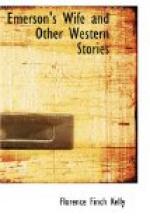But against Tuttle’s suggestion of postponing the conflict he presented a surprised and combative front. “What you-all thinkin’ of, Tom? Why, we ’ve got ’em holed up now, and all that’s to do is to smoke ’em out!”
“It’s Emerson I ‘m thinkin’ of—and Mrs. Emerson. He—he wrote her a letter this mornin’, and put it in his pocket, and asked me if anything happened to him to see that she got it. Nick, I—I don’t like to think about that! If we put this thing off, he ’ll go home, and then we-all can fight it through without him, mebbe. Nick, you was a sure kiote to send for him yesterday.”
“Yes, I sure was,” said Nick with sorrowful conviction. Then he added, with an air of cheerful finality, “Well, I would n’t ‘a’ done it if I had n’t been drunk! But you ’re right, Tommy. It ain’t the square deal to Mrs. Emerson for us to take him into this business. It ’ll be a fight to a finish, for one side or the other, and it’s just as likely to be us as them.”
At that moment Mead came up, saying briskly, “Well, boys, had n’t we better be starting out?”
Like his two friends, Emerson Mead was Texan born and bred; but a New England strain in his blood, with its potent strength and sanity, had given him such poise and force of character as had made him the leader of the three through their long and intimate friendship and strenuous life.
“I ‘ve just been sayin’ to Nick,” Tom replied, his eyes evading those of his friend, “that mebbe we ’d better let this thing slide till Black and Williamson get back.”
“Well, Tom, this is your shindy, and whatever you say goes. But I sure think that if you really want to get this Dysert gang, the thing to do is to trot in and get ’em, right now. You know yourself that Black ain’t any too warm about it, and Williamson is so under Dell Baxter’s thumb that he ’s more likely to trip you up, if he can, than he is to help. You-all won’t get another chance as good as this!”
Ellhorn’s martial ardor, and his buoyant belief that Mead’s marriage had in no wise lessened his immunity from bullets, obscured for the moment his anxiety about Mrs. Mead. He slapped his thigh, exclaiming, “Them’s my sentiments, boys! Come on! Let’s pull our freight!”
Tuttle’s manner still showed some reluctance, but he said no more, and the three Texans, each of them six feet three or more in his stockings, broad-shouldered, and straight as an arrow, swung into the street.
They took with them Willoughby Simmons, the deputy sheriff for whose judgment Tom had so little esteem. Tuttle sent him to guard the rear of the house, a small, detached adobe, in which Dysert and an unknown number of his followers had fortified themselves. Some twenty feet in front and toward one corner of the house grew a large old apple tree, its leaves and pink-nosed buds just beginning to make themselves manifest, and underneath it were some piles of wood. It was the only position that offered cover. Tuttle asked Mead to station himself there, where he could command one end of the house, a view toward the rear, and the whole front. Ellhorn he placed similarly at the other front corner. His own position he took midway between the two, facing the door and two small windows that blinked beneath the narrow portal.




